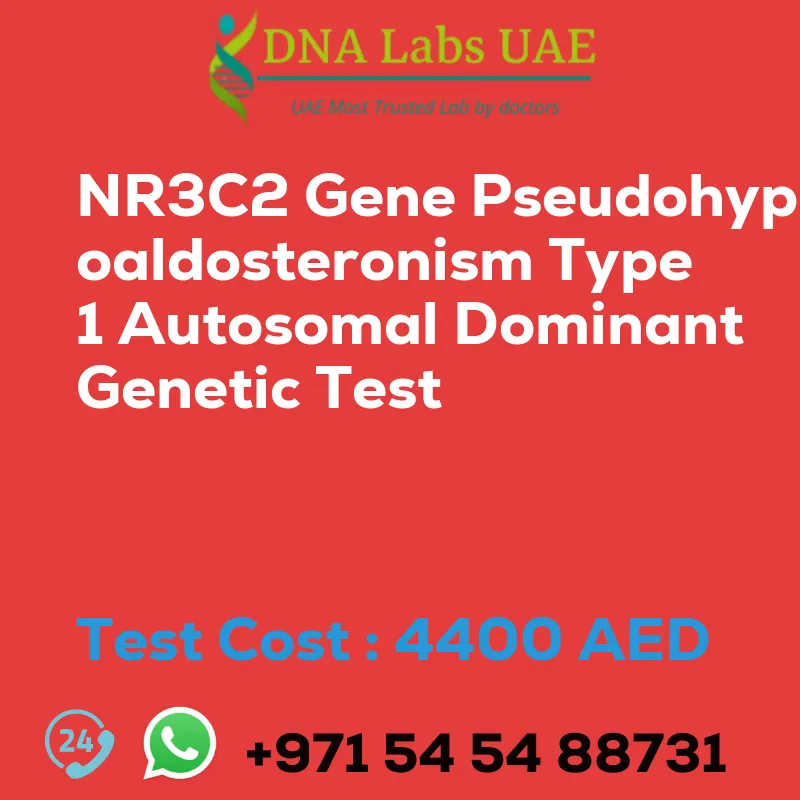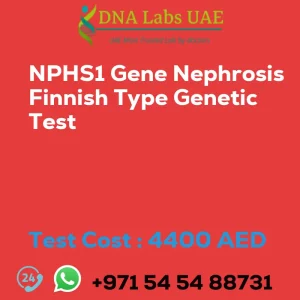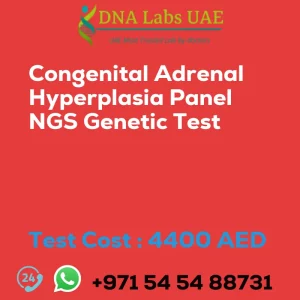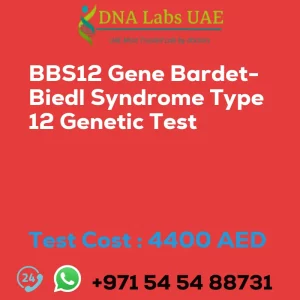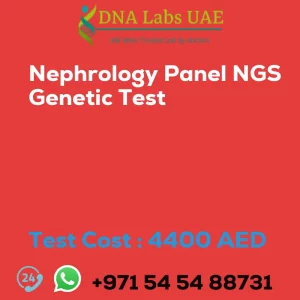NR3C2 Gene Pseudohypoaldosteronism type 1 autosomal dominant Genetic Test
Components
- Price: 4400.0 AED
- Sample Condition: Blood or Extracted DNA or One drop Blood on FTA Card
- Report Delivery: 3 to 4 Weeks
- Method: NGS Technology
- Test type: Hepatology Nephrology Endocrinology Disorders
- Doctor: General Physician
- Test Department: Genetics
Pre Test Information
Clinical History of Patient who is going for NR3C2 Gene Pseudohypoaldosteronism, type 1, autosomal dominant NGS Genetic DNA Test. A Genetic Counselling session to draw a pedigree chart of family members affected with NR3C2 Gene Pseudohypoaldosteronism, type 1, autosomal dominant NGS Genetic DNA Test gene NR3C2.
Test Details
The NR3C2 gene is associated with a condition called pseudohypoaldosteronism, type 1 (PHA1). PHA1 is a rare genetic disorder characterized by an inability of the kidneys to respond to the hormone aldosterone, which regulates the balance of salt and water in the body. The NR3C2 gene provides instructions for making a protein called the mineralocorticoid receptor (MR). This protein is responsible for binding to aldosterone and activating genes that help regulate sodium and potassium levels in the kidneys. Mutations in the NR3C2 gene can disrupt the function of the mineralocorticoid receptor, leading to the signs and symptoms of PHA1. These may include dehydration, excessive salt loss, low blood pressure, high potassium levels, and failure to thrive in infants.
NGS (Next-Generation Sequencing) genetic testing is a method used to analyze multiple genes simultaneously. In the case of PHA1, NGS can be used to identify mutations in the NR3C2 gene, allowing for a definitive diagnosis of the condition. This test can help determine the underlying cause of PHA1 in an individual and guide appropriate treatment and management strategies. It is important to note that PHA1 can also be caused by mutations in other genes, such as the SCNN1A, SCNN1B, and SCNN1G genes, which are associated with autosomal recessive forms of the condition. Therefore, NGS testing may include analysis of multiple genes to ensure a comprehensive evaluation of the genetic causes of PHA1.
| Test Name | NR3C2 Gene Pseudohypoaldosteronism type 1 autosomal dominant Genetic Test |
|---|---|
| Components | |
| Price | 4400.0 AED |
| Sample Condition | Blood or Extracted DNA or One drop Blood on FTA Card |
| Report Delivery | 3 to 4 Weeks |
| Method | NGS Technology |
| Test type | Hepatology Nephrology Endocrinology Disorders |
| Doctor | General Physician |
| Test Department: | Genetics |
| Pre Test Information | Clinical History of Patient who is going for NR3C2 Gene Pseudohypoaldosteronism, type 1, autosomal dominant NGS Genetic DNA Test. A Genetic Counselling session to draw a pedigree chart of family members affected with NR3C2 Gene Pseudohypoaldosteronism, type 1, autosomal dominant NGS Genetic DNA Test gene NR3C2 |
| Test Details |
The NR3C2 gene is associated with a condition called pseudohypoaldosteronism, type 1 (PHA1). PHA1 is a rare genetic disorder characterized by an inability of the kidneys to respond to the hormone aldosterone, which regulates the balance of salt and water in the body. The NR3C2 gene provides instructions for making a protein called the mineralocorticoid receptor (MR). This protein is responsible for binding to aldosterone and activating genes that help regulate sodium and potassium levels in the kidneys. Mutations in the NR3C2 gene can disrupt the function of the mineralocorticoid receptor, leading to the signs and symptoms of PHA1. These may include dehydration, excessive salt loss, low blood pressure, high potassium levels, and failure to thrive in infants. NGS (Next-Generation Sequencing) genetic testing is a method used to analyze multiple genes simultaneously. In the case of PHA1, NGS can be used to identify mutations in the NR3C2 gene, allowing for a definitive diagnosis of the condition. This test can help determine the underlying cause of PHA1 in an individual and guide appropriate treatment and management strategies. It is important to note that PHA1 can also be caused by mutations in other genes, such as the SCNN1A, SCNN1B, and SCNN1G genes, which are associated with autosomal recessive forms of the condition. Therefore, NGS testing may include analysis of multiple genes to ensure a comprehensive evaluation of the genetic causes of PHA1. |

